A new type of content discovery platform which allows professionals to improve their knowledge and keep track of quality content in a single feed via a Google Chrome new-tab extension
It’s Monday. Your inbox shows a gazillion emails and most are from blogs you’re subscribed to. You already know that about 90% of them aren’t that relevant to you and that some 9% of them are lack of added value.
You pick up your mobile and scroll through the Facebook/LinkedIn/Twitter feeds. While scrolling, you see a post about the latest content marketing technique. This post already has 400+ likes, some are your colleagues, but while you skim through the article you say to yourself “why have all these professionals liked this article? It’s full of basic fluff”.
These days we are consuming our content mainly through blog subscription and social media. We are being bombarded with marketing content that we shouldn't even be exposed to because it’s not suited to our expert level, or just has a clickbait headline that caused us to consume something that is too basic.
Can you relate?
Keeping yourself and your team’s knowledge grow and up-to-date can be challenging with the plethora of content readily available on different websites.
The team at Smart Insights use a new Google Chrome extension, Zest.is, uses a unique way to filter and individualize high-quality marketing content sources, recommended and filtered by their own community members who are mostly professional marketers, and displays them in one easy-to-use feed via the ‘new tab’ dashboard.
We were keen to interview Yam Regev, the CMO and co-founder of Zest, to find out how this content discovery platform can help marketers increase professional knowledge, and also about Zest’s own marketing strategies and plans for the future of marketing content discovery.
What inspired you to create Zest for marketers?
My partner (Idan Yalovich) and I felt something was wrong with the way professionals were consuming content and we wanted to provide an alternative. Most of the content we consume is coming from different kinds of sources, including:
- Subscriptions to blogs and email newsletters
- Social media
Subscriptions to blogs are great, however, there are some disadvantages: users are bombarded with different articles and emails containing content for them to read but how much of that content has been personalized for each individual? Some of the content that is sent to users aren’t always a perfect fit for the skills and knowledge they need to know to progress and develop/expand their business.
Blog articles can range from basic to advanced reads and so as a CMO I am only interested in the more advanced articles to develop my professional skills - this filter is not always applied and so many senior level marketers will find themselves scrolling through blog newsletters that are filled with articles that are not well suited to their interest and role.
The second way marketing content is consumed is through social media. We find that social feeds are a mix of professional and personal content.
For example, I see that a certain marketing article has only been posted 3 minutes ago but already has 700+ likes, some of these likes came from my colleagues who I respect and some who have more experience than me - now this article isn’t a read, it’s at least 2,400 words. I think to myself that what are the chances that in 3 minutes 700+ people have read this long-form article? It doesn’t make any sense to me and it’s making me doubt the quality and relevancy of the post. We find, quite frequently, that articles are being liked and shared without being read, so it can be very hard to judge the quality of the article.
We’ve reached a point in which algorithms are functioning as our personal content editors. Now algorithms can’t know if this professional article has any kind of added value for me and the specific knowledge I need to know.
To solve this problem, we understand that only a human and fellow professional can judge whether this content is really useful, actionable, and will provide any added value to the reader and community of professionals.
Combining a human-reviewed content and approval flow along with machine learning that will better understand each individual user’s stage in their career and interaction with the content they consume is the solution we offer to this Information Overload era we all leave in and this is exactly what Zest does.
This technique is taking from Computer Science and called Human-based computation.
A proactive community structure that filters the suggested marketing content
This structure of a proactive community is built on the idea that by sharing high-quality content, which is filtered and moderated by humans, marketing professionals will be delivered with actionable content they need. That way they will not need to scroll through endless feeds or search for content they need to improve themselves as professionals.
A multi-level, human-based content moderation process
The content on Zest is for marketers suggested by other marketers. Suggestions are from community members who have read an article and think that it is informative and helpful and that others need to read it too.
Then we have what we call uber users who are marking these articles as valuable or not valuable. The valuable ones are sent to our two Chief Moderators who give a final evaluation of the suggested content. If the content is good enough the content is then scheduled and published in the Zest feed.
- Articles must meet certain criteria to be published:
- Actionable with key takeaways
- In-depth and provides a high level of expertise and knowledge
- Contains good statistics and data to make a stronger case/argument
- Must be recent - in most cases, we are not approving articles that have no published date. Marketers need to read up-to-date advice, that is not several years old and no longer relevant to the industry as it is now
Several humans are checking the articles before they are published. We are treating content seriously, it shouldn’t be basic and fluffy. You shouldn’t have to produce content just for the sake of ranking higher in Google, or churning out content regularly that isn’t high quality. We’re looking for the really good, high-quality posts that will genuinely help other marketers to improve their professional knowledge.
As for machine learning, we are building three types of machines that will help us to empower the multi-level, human-based content moderation process.
The first machine learns the type of content once a member suggests it on Zest. The machine then analyzes the domain authority, keywords density, and past approval success of this domain on Zest. It also analyzes the suggester profile and their previous approval success rate. At this point, this machine can already mark content as potentially good or bad.
The hyper-growth of Zest and looking into the future
We have a double-digit growth and 12,000 weekly active users after launching 6 months ago and we generate 120K outbound clicks each month.
Some stats and demographics:
CMOs, VPs, and marketing managers compose 92% of the Zest Community.
77% of users are from Western countries.
This week we’re launching our first revenue channel - Content Boost.
Content Boost was tested with tier-one marketing brands like Aweber, Sumo.com and AdEspresso to name a few.
We’ve already completed over 60 alpha and beta tests.
Moreover, and this is really cool, we also have a User Advisory Board as we’re really keen to keep Zest as a community-oriented platform. The Content Boost page design, layout, microcopy, etc. was based on feedback by more than 70 of our members that are integrally involved in everything we do, including our product roadmap, launches, and other product-related strategic decisions.
Essentially, with Content Boost, big brands can give their approved content extra exposure on Zest (10x more than a regular article that is approved and published on the platform).
While we will make sure that a boosted post gets more exposure on Zest, we will never have display ads or banners on the platform, as that is not the type of advertising that is valuable for marketers wanting to develop professional knowledge.
This way, we are ensuring that content that is being sold is valuable as it will go through the same moderation flow as any other content on Zest.
We have found that 69% of our users are in senior-level positions, either CEOs, CMO and VPs, therefore the content that is shared on Zest need to be valuable. We also know it is valuable to have your content seen by these expert marketers and high-level influencers. We think this is the best way to do it.
We will feature only 4 partners per week as we do not want to pollute our feed. We also work with full transparency: if the content is promoted, they will have an icon to show that articles have been promoted via payment.
We are also keen to know how these professionals progress in their careers and what types of articles they read to achieve this. This way we will be able to map out a member’s professional timeline.
At the moment we only offer a Google Chrome extension. One possible direction for future plans is to evaluate the value of offering a web-based site with a separate URL and domain.
By combining human valuation with machine learning, we are the go-to place for professionals to discover and consume professional knowledge.
source https://www.smartinsights.com/content-management/managing-content-marketing/content-discovery-platform/

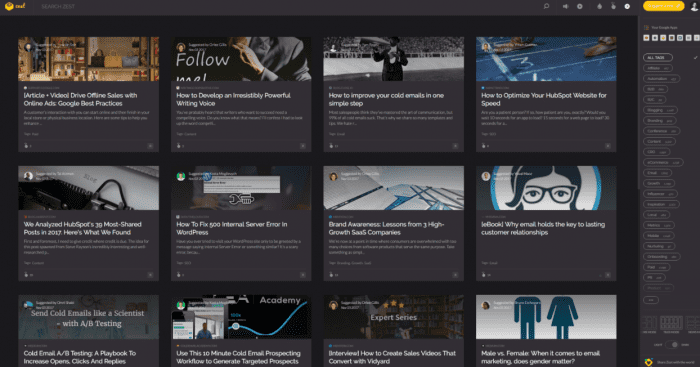

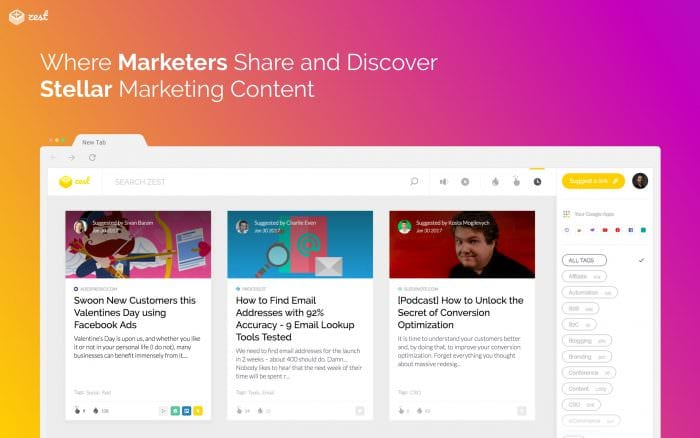
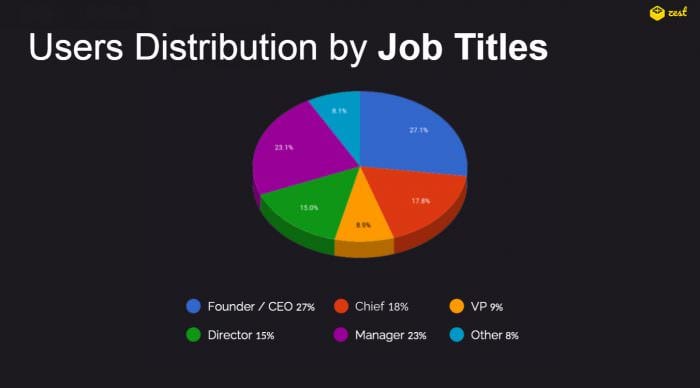
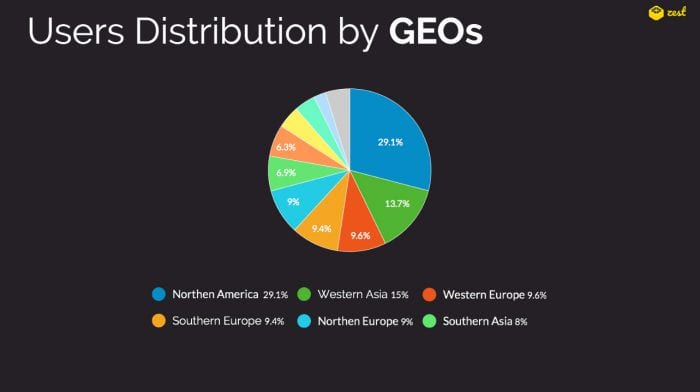
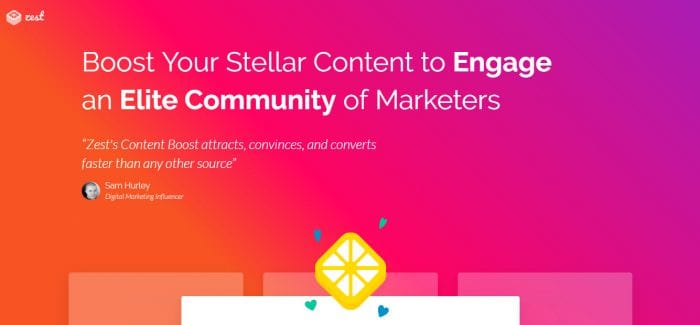
No comments:
Post a Comment